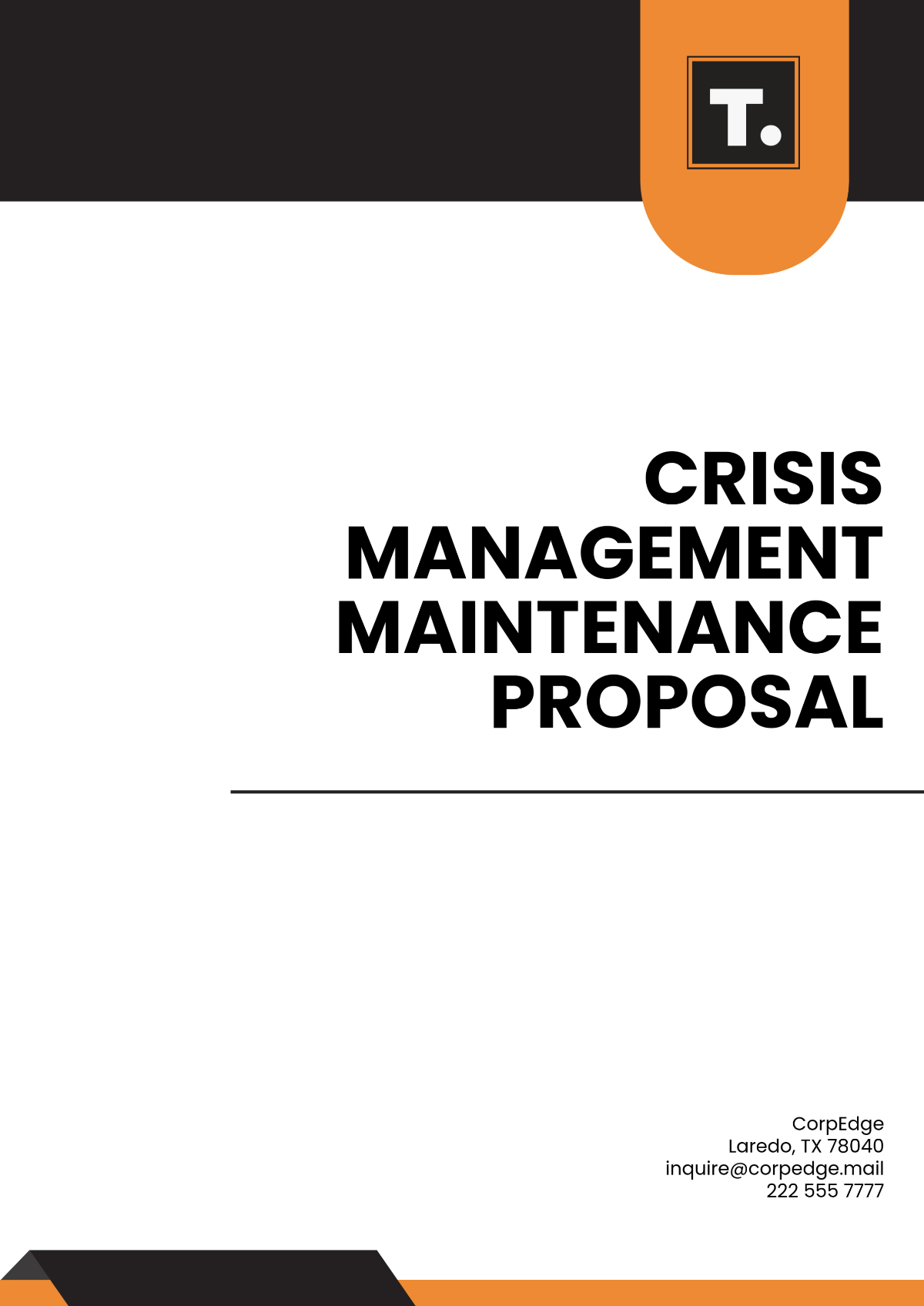Free Crisis Management Maintenance Proposal

Prepared by: [Your Company Name]
Date: January 1, 2060
I. Executive Summary
This proposal outlines a comprehensive approach to crisis management maintenance, aiming to equip the organization with robust mechanisms to identify, address, and mitigate risks effectively. By implementing strategic risk assessment, developing adaptable response strategies, ensuring business continuity, and establishing clear communication protocols, the proposal seeks to maintain organizational resilience against any potential crises from the year 2060 onwards.
II. Introduction
Crisis management is a critical component of modern organizational strategy, essential for safeguarding assets, reputation, and operational capabilities. This proposal sets forth a structured framework to enhance the organization's preparedness and response capabilities, ensuring seamless business operations even amidst unforeseen crises.
III. Risk Assessment
Effective crisis management begins with a thorough risk assessment. By identifying potential threats and evaluating their likelihood and impact, we can prioritize resources and tailor our response strategies. Key risks include:
Cybersecurity threats
Natural disasters
Supply chain disruptions
Pandemic outbreaks
Regulatory changes
Each risk will be analyzed based on historical data, industry trends, and expert insights to ensure a comprehensive understanding.
IV. Crisis Management Strategies
To manage varying crisis scenarios effectively, the following strategies will be deployed:
Cybersecurity Breach Response: Immediate isolation of affected systems, engagement of cybersecurity experts, and steps to secure data and inform stakeholders.
Natural Disaster Preparedness: Establishment of remote work capabilities and redundant data systems to ensure continuity of services.
Supply Chain Resilience: Development of diversified supplier networks and stockpiling of essential materials to mitigate disruptions.
Health Crisis Management: Implementation of health and safety protocols, remote work policies, and readiness plans for workforce disruptions.
V. Business Continuity Plan
A comprehensive Business Continuity Plan (BCP) is vital for maintaining operations during crises. Key actions include:
Activation of emergency response teams
Deployment of alternative work sites and communication channels
Regular BCP updates and drills
The BCP ensures core functions can operate under varying conditions, maintaining service delivery and stakeholder confidence.
VI. Roles and Responsibilities
Role | Responsibilities |
|---|---|
Crisis Manager | Oversee crisis management efforts, coordinate teams, and communicate with leadership. |
IT Head | Ensure technological resilience and manage cybersecurity responses. |
HR Director | Manage workforce logistics and ensure employee safety and communication. |
VII. Communication Plan
Effective communication is paramount during crises. The communication plan involves:
Developing pre-approved internal communication templates
Establishing external communication protocols with stakeholders and media
Using multiple channels like email, social media, and press releases to disseminate information
VIII. Training and Testing
Regular training and testing are essential to maintain readiness. This includes:
Annual crisis management workshops for key personnel
Bi-annual simulation exercises
Feedback and improvement loops to adapt to emerging threats and technologies
IX. Budget and Resources
To sustain robust crisis management systems, necessary financial and human resources must be allocated. Estimated costs include:
Category | Cost (in USD) |
|---|---|
Technology Upgrades | $250,000 |
Training Programs | $100,000 |
Consulting Services | $150,000 |
X. Conclusion
In conclusion, the proposal underscores the necessity for a dynamic and integrated crisis management framework. Implementing effective strategies, ensuring business continuity, and promoting adaptive communication can significantly alleviate the impacts of potential crises. Forward-looking investments in crisis management engender resilience and provide hallmarks of an organization poised for future challenges and opportunities.
- 100% Customizable, free editor
- Access 1 Million+ Templates, photo’s & graphics
- Download or share as a template
- Click and replace photos, graphics, text, backgrounds
- Resize, crop, AI write & more
- Access advanced editor
The Crisis Management Maintenance Proposal Template from Template.net is designed to help you create effective proposals for crisis management services. Editable and customizable, it allows you to outline strategies, resource allocations, and costs for responding to various crises. Ideal for crisis management consultants and service providers. Editable in our Ai Editor Tool, it lets you easily adjust and personalize the proposal as needed.
You may also like
- Business Proposal
- Research Proposal
- Proposal Request
- Project Proposal
- Grant Proposal
- Photography Proposal
- Job Proposal
- Budget Proposal
- Marketing Proposal
- Branding Proposal
- Advertising Proposal
- Sales Proposal
- Startup Proposal
- Event Proposal
- Creative Proposal
- Restaurant Proposal
- Blank Proposal
- One Page Proposal
- Proposal Report
- IT Proposal
- Non Profit Proposal
- Training Proposal
- Construction Proposal
- School Proposal
- Cleaning Proposal
- Contract Proposal
- HR Proposal
- Travel Agency Proposal
- Small Business Proposal
- Investment Proposal
- Bid Proposal
- Retail Business Proposal
- Sponsorship Proposal
- Academic Proposal
- Partnership Proposal
- Work Proposal
- Agency Proposal
- University Proposal
- Accounting Proposal
- Real Estate Proposal
- Hotel Proposal
- Product Proposal
- Advertising Agency Proposal
- Development Proposal
- Loan Proposal
- Website Proposal
- Nursing Home Proposal
- Financial Proposal
- Salon Proposal
- Freelancer Proposal
- Funding Proposal
- Work from Home Proposal
- Company Proposal
- Consulting Proposal
- Educational Proposal
- Construction Bid Proposal
- Interior Design Proposal
- New Product Proposal
- Sports Proposal
- Corporate Proposal
- Food Proposal
- Property Proposal
- Maintenance Proposal
- Purchase Proposal
- Rental Proposal
- Recruitment Proposal
- Social Media Proposal
- Travel Proposal
- Trip Proposal
- Software Proposal
- Conference Proposal
- Graphic Design Proposal
- Law Firm Proposal
- Medical Proposal
- Music Proposal
- Pricing Proposal
- SEO Proposal
- Strategy Proposal
- Technical Proposal
- Coaching Proposal
- Ecommerce Proposal
- Fundraising Proposal
- Landscaping Proposal
- Charity Proposal
- Contractor Proposal
- Exhibition Proposal
- Art Proposal
- Mobile Proposal
- Equipment Proposal
- Student Proposal
- Engineering Proposal
- Business Proposal





























